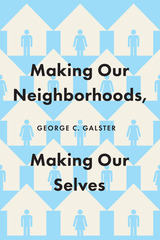19 start with E start with E
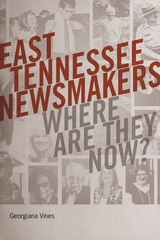
The Sunsphere, World’s Fair Site, and Neyland Stadium are Knoxville landmarks of pride and passion, history and culture. But anyone who has resided in this mid-sized southern city knows that it derives its unique glow not so much from its locale but from its people— the ones who built it and stayed true to it over the years.
In East Tennessee Newsmakers, Georgiana Vines pays tribute to some remarkable individuals and their contributions to Knoxville and the history, civic and cultural life, and politics of East Tennessee. Some personalities linked with the Great Smoky Mountains National Park are part of the blend. While many of these profiles celebrate personal achievement and local renown, the true narrative is found in the tapestry as a whole.
Presenting the narrative in five parts—Political Notes, UT Spotlights, Media Sparks, Park Personalities, and About Town—Vines prefaces the stories with insight into her inspiration for the collection, discussing her career in journalism and how a Knoxville News Sentinel features series bloomed into the present book-length work on notable and interconnected Knoxvillians and other East Tennesseans. From political figures like Jimmy Duncan and Tipper Gore to well-known local personalities, including Sam Beall and Mary Lynn Majors, their stories and many more have here been updated and expanded into an impressively researched, entertaining, and valuable history of the colorful and dynamic city of Knoxville and the people who have made it so.
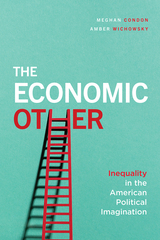
Through an astute blend of experiments, surveys, and descriptions people offer in their own words, The Economic Other reveals that when less-advantaged Americans compare with the rich, they become more accurate about their own status and want more from government. But American society is structured to prevent upward comparison. In an increasingly divided, anxious nation, opportunities to interact with the country’s richest are shrinking, and people prefer to compare to those below to feel secure. Even when comparison with the rich does occur, many lose confidence in their power to effect change.
Laying bare how social comparisons drive political attitudes, The Economic Other is an essential look at the stubborn plight of inequality and the measures needed to solve it.
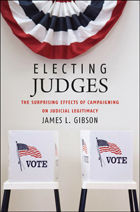
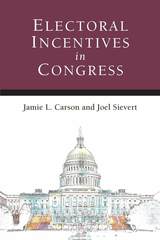
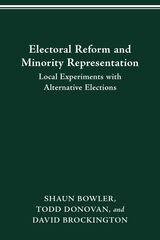
Questions of minority representation have long plagued the U.S. voting systems. The standard election often leaves political, racial, or ethnic minorities with little chance of being represented. Race-conscious districting remains the primary policy tool used for providing representation of racial and ethnic minorities in the United States—and it continues to generate tremendous conflict. Can alternatives to race-conscious, single-member districts offer benefits that extend beyond simply providing descriptive representations of minorities?
This study examines one such “semi-proportional” representation election system: Cumulative Voting (CV). For over a decade, scores of local U.S. governments have been elected by Cumulative Voting. This provides us with the ability to examine the effects of CV elections over time. Moreover, the use of CV in the United States allows us to compare politics in places that adopted CV to highly similar places that did not. Electoral Reform and Minority Representation shares evidence that CV elections can produce minority representation that matches levels generated with the drawing of race-conscious “majority-minority” districting. It also offers evidence that the quality of democratic processes in CV communities is in several ways higher that those under districts.
Given America’s growing racial and ethnic diversity, and given successful legal challenges that limit the use of race-conscious districting Electoral Reform and Minority Representation suggests that Cumulative Voting may be a better way to achieve minority representation in U.S. politics.
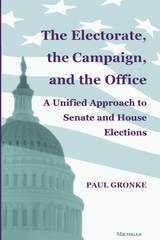
Congressional elections research holds that Senate races are more competitive than House contests because states are more heterogeneous, or because candidates are more prominent and raise more money, or because voters have fundamentally different expectations. Because House and Senate contests are seldom compared, we have little empirical evidence to test the various hypotheses about how voters make choices for different offices. Gronke finds that the similarities between House and Senate elections are much greater than previously thought and that voters make their decisions in both races on the same bases.
Gronke first looks at differences in congressional districts and states, showing that context does not really help us understand why Senate elections feature better candidates, higher spending, and closer outcomes. Next, he turns to campaigns. Surprisingly, over a turbulent twenty-year period, House and Senate candidacies have retained the same competitive dynamics.
Gronke also considers voting behavior in House and Senate elections. Focusing on the 1988 and 1990 elections, he argues that voters do not distinguish between institutions, applying fundamentally the same decision rule, regardless of the office being contested. Gronke closes by considering the implications of his results for the way we relate settings, electoral dynamics, and institutional arrangements.
This book will appeal to those interested in Congress, political campaigning, and voting.
Paul Gronke is Associate Professor of Political Science at Reed College.
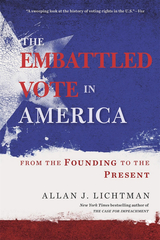
“A sweeping look at the history of voting rights in the U.S.”—Vox
Who has the right to vote? And who benefits from exclusion?
For most of American history, the right to vote has been a privilege restricted by wealth, sex, race, and literacy. Economic qualifications were finally eliminated in the nineteenth century, but the ideal of a white man’s republic persisted long after that. Women and racial minorities had to fight hard and creatively to secure their voice, but voter identification laws, registration requirements, and voter purges continue to prevent millions of American citizens from voting.
An award-winning historian and voting right activist, Allan Lichtman gives us the history behind today’s headlines. He shows that political gerrymandering and outrageous attempts at voter suppression have been a fixture of American democracy—but so have efforts to fight back and ensure that every citizen’s voice be heard.
“Lichtman uses history to contextualize the fix we’re in today. Each party gropes for advantage by fiddling with the franchise… Growing outrage, he thinks, could ignite demands for change. With luck, this fine history might just help to fan the flame.”
—New York Times Book Review
“The great value of Lichtman’s book is the way it puts today’s right-wing voter suppression efforts in their historical setting. He identifies the current push as the third crackdown on African-American voting rights in our history.”
—Michael Tomasky, New York Review of Books
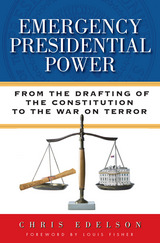
Winner, Crader Family Book Prize in American Values, Department of History and Crader Family Endowment for American Values, Southeast Missouri State University
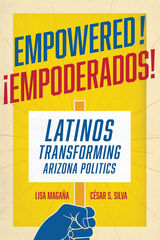
Empowered!examines Arizona’s recent political history and how it has been shaped and propelled by Latinos. It also provides a distilled reflection of U.S. politics more broadly, where the politics of exclusion and the desire for inclusion are forces of change.
Lisa Magaña and César S. Silva argue that the state of Arizona is more inclusive and progressive then it has ever been. Following in the footsteps of grassroots organizers in California and the southeastern states, Latinos in Arizona have struggled and succeeded to alter the anti-immigrant and racist policies that have been affecting Latinos in the state for many years. Draconian immigration policies have plagued Arizona’s political history. Empowered! shows innovative ways that Latinos have fought these policies.
Empowered! focuses on the legacy of Latino activism within politics. It raises important arguments about those who stand to profit financially and politically by stoking fear of immigrants and how resilient politicians and grassroots organizers have worked to counteract that fear mongering. Recognizing the long history of disenfranchisement and injustice surrounding minority communities in the United States, this book outlines the struggle to make Arizona a more just and equal place for Latinos to live.
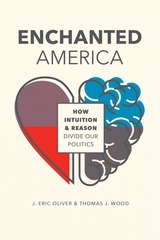
The answer, according to J. Eric Oliver and Thomas J. Wood, can be found in the most important force shaping American politics today: human intuition. Much of what seems to be irrational in American politics arises from the growing divide in how its citizens make sense of the world. On one side are rationalists. They use science and reason to understand reality. On the other side are intuitionists. They rely on gut feelings and instincts as their guide to the world. Intuitionists believe in ghosts and End Times prophecies. They embrace conspiracy theories, disbelieve experts, and distrust the media. They are stridently nationalistic and deeply authoritarian in their outlook. And they are the most enthusiastic supporters of Donald Trump. The primary reason why Trump captured the presidency was that he spoke about politics in a way that resonated with how Intuitionists perceive the world. The Intuitionist divide has also become a threat to the American way of life. A generation ago, intuitionists were dispersed across the political spectrum, when most Americans believed in both God and science. Today, intuitionism is ideologically tilted toward the political right. Modern conservatism has become an Intuitionist movement, defined by conspiracy theories, strident nationalism, and hostility to basic civic norms.
Enchanted America is a clarion call to rationalists of all political persuasions to reach beyond the minority and speak to intuitionists in a way they understand. The values and principles that define American democracy are at stake.
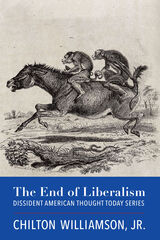
Williamson observes that this liberalism to nevertheless be collapsing, given the obvious opposition to the idea that it is essential to modernity. Liberalism is ironically a kind of unyielding control, "a relativist persuasion that discourages and resists fixed beliefs and certainties and the idea of truth itself." Williamson offers commentary on the present state of liberal ideas and their crimes against better judgment, and vindicates conservatism from being labeled reactionary. Liberalism is exposed as a faith we cannot accept, for it contains nothing to be believed and what it says about the order of things is pure fiction.
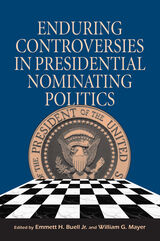
Enduring Controversies in Presidential Nominating Politics retraces the more than two hundred-year history of presidential elections in the United States to provide a primer on how the process has evolved from the days of the founders, through the heyday of nominating conventions, to today’s overwhelming interest in early primaries.
Original essays by the editors introduce, critique, and occasionally even refute a wide variety of historical readings including Alexander Hamilton’s defense of election procedures, excerpts of individual states’ nominations of candidates in 1824, an overview of the impact television has had on nominating conventions, and calls for a national rotating primary scheme in 2004. As a whole, the collection reveals the common threads that run through the history of the nominating process, and points out that today’s litany of complaints is not at all new.
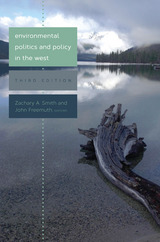
In the third edition of Environmental Politics and Policy in the West, Zachary A. Smith and John Freemuth bring together a roster of top scholars to explicate the key issues involved. The volume has been completely updated to cover rapidly changing developments in the West, including climate change, land management politics and policy, science controversies, western water and river restoration, tribal sovereignty issues, the management of endangered species, and renewable energy development. Contributors also address how bureaucracy and politics shape environmental dialogues and explore multifaceted issues such as the politics of dam removal and restoration, wildlife resource concerns, suburban sprawl and smart growth, the management of renewable resources, public land reform and science, tribal sovereignty and energy, and the allocation of the West’s tightly limited water resources.
This timely new edition offers a comprehensive and current survey of influential western policy and environmental issues. It will be of great use to students of environmental studies and also public and environmental policy, as well as activists and professionals working in the environmental arena.
Contributors: Leslie R. Alm, Esther Babcock, Hugh Bartling, Matthew A. Cahn, Charles Davis, Sandra Davis, Megan M. DeMasters, Duran Fiack, Robert E. Forbis Jr., John Freemuth, Sheldon Kamieniecki, Matt Lindstrom, Jean C. Mangun, William R. Mangun, Denise McCain-Tharnstrom, Daniel McCool, Zachary A. Smith
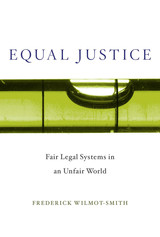
A philosophical and legal argument for equal access to good lawyers and other legal resources.
Should your risk of wrongful conviction depend on your wealth? We wouldn’t dream of passing a law to that effect, but our legal system, which permits the rich to buy the best lawyers, enables wealth to affect legal outcomes. Clearly justice depends not only on the substance of laws but also on the system that administers them.
In Equal Justice, Frederick Wilmot-Smith offers an account of a topic neglected in theory and undermined in practice: justice in legal institutions. He argues that the benefits and burdens of legal systems should be shared equally and that divergences from equality must issue from a fair procedure. He also considers how the ideal of equal justice might be made a reality. Least controversially, legal resources must sometimes be granted to those who cannot afford them. More radically, we may need to rethink the centrality of the market to legal systems. Markets in legal resources entrench pre-existing inequalities, allocate injustice to those without means, and enable the rich to escape the law’s demands. None of this can be justified. Many people think that markets in health care are unjust; it may be time to think of legal services in the same way.
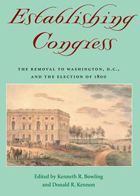
Establishing Congress: The Removal to Washington, D.C., and the Election of 1800 focuses on the end of the 1790s, when, in rapid succession, George Washington died, the federal government moved to Washington, D.C., and the election of 1800 put Thomas Jefferson and the Democratic-Republican Party in charge of the federal government.
Establishing Congress dispels the myths and misinformation that surround the federal government’s move to Washington and demonstrates that the election of 1800 changed American party politics forever, establishing the success of the American experiment in government and completing the founding of the Republic. It also contends that the lame-duck session of Congress had far-reaching implications for the governance of the District of Columbia. Later chapters examine aspects of the political iconography of the Capitol—one illuminating Jefferson’s role in turning the building into a temple for the legislature and an instrument for nation-building, another analyzing the fascinating decades-long debate over whether to bury George Washington in the Capitol.
The book considers as well the political implications of social life in early Washington, examining the political lobbying by Washington women within a social context and detailing the social and political life in the city’s homes, hotels, boardinghouses, and eating messes. Establishing Congress is an invaluable reference work for anyone interested in these pivotal moments in American history.

Establishing Congress: The Removal to Washington, D.C., and the Election of 1800 focuses on the end of the 1790s, when, in rapid succession, George Washington died, the federal government moved to Washington, D.C., and the election of 1800 put Thomas Jefferson and the Democratic-Republican Party in charge of the federal government.
Establishing Congress dispels the myths and misinformation that surround the federal government’s move to Washington and demonstrates that the election of 1800 changed American party politics forever, establishing the success of the American experiment in government and completing the founding of the Republic. It also contends that the lame-duck session of Congress had far-reaching implications for the governance of the District of Columbia. Later chapters examine aspects of the political iconography of the Capitol—one illuminating Jefferson’s role in turning the building into a temple for the legislature and an instrument for nation-building, another analyzing the fascinating decades-long debate over whether to bury George Washington in the Capitol.
The book considers as well the political implications of social life in early Washington, examining the political lobbying by Washington women within a social context and detailing the social and political life in the city’s homes, hotels, boardinghouses, and eating messes. Establishing Congress is an invaluable reference work for anyone interested in these pivotal moments in American history.
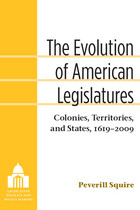
The institutional development of American legislatures, beginning with the first colonial assembly of 1619, has been marked by continuity as well as change. Peverill Squire draws upon a wealth of primary sources to document this institutional history. Beginning with the ways in which colonial assemblies followed the precedents of British institutions, Squire traces the fundamental ways they evolved to become distinct. He next charts the formation of the first state legislatures and the Constitutional Congress, describes the creation of territorial and new state legislatures, and examines the institutionalization of state legislatures in the nineteenth century and their professionalization since 1900.
With his conclusion, Squire discusses the historical trajectory of American legislatures and suggests how they might further develop over the coming decades. While Squire's approach will appeal to historians, his focus on the evolution of rules, procedures, and standing committee systems, as well as member salaries, legislative sessions, staff, and facilities, will be valuable to political scientists and legislative scholars.
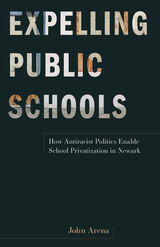
Exploring the role of identitarian politics in the privatization of Newark’s public school system
In Expelling Public Schools, John Arena explores the more than two-decade struggle to privatize public schools in Newark, New Jersey—a conflict that is raging in cities across the country—from the vantage point of elites advancing the pro-privatization agenda and their grassroots challengers.
Analyzing the unsuccessful effort of Cory Booker—Newark’s leading pro-privatization activist and mayor—to generate popular support for the agenda, and Booker’s rival and ultimate successor Ras Baraka’s eventual galvanization of the charter movement, Arena argues that Baraka’s black radical politics cloaked a revanchist agenda of privatization.
Expelling Public Schools reveals the political rise of Booker and Baraka, their one-time rivalry and subsequent alliance, and what this particular case study illuminates about contemporary post–civil rights Black politics. Ultimately, Expelling Public Schools is a critique of Black urban regime politics and the way in which antiracist messaging obscures real class divisions, interests, and ideological diversity.
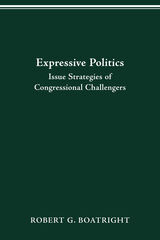
This research makes two types of contributions to existing political science literature. On a theoretical level, it argues for a reconceptualization of the motives of candidates and parties in rational choice analysis. On a practical level, it seeks to enrich our understanding of the role that challengers play in American elections and of the reason why different types of challengers emerge in different types of elections. Boatright argues that the role of challengers in the American electoral process can be understood only if we broaden our theories about rational candidate behavior.
READERS
Browse our collection.
PUBLISHERS
See BiblioVault's publisher services.
STUDENT SERVICES
Files for college accessibility offices.
UChicago Accessibility Resources
home | accessibility | search | about | contact us
BiblioVault ® 2001 - 2024
The University of Chicago Press


